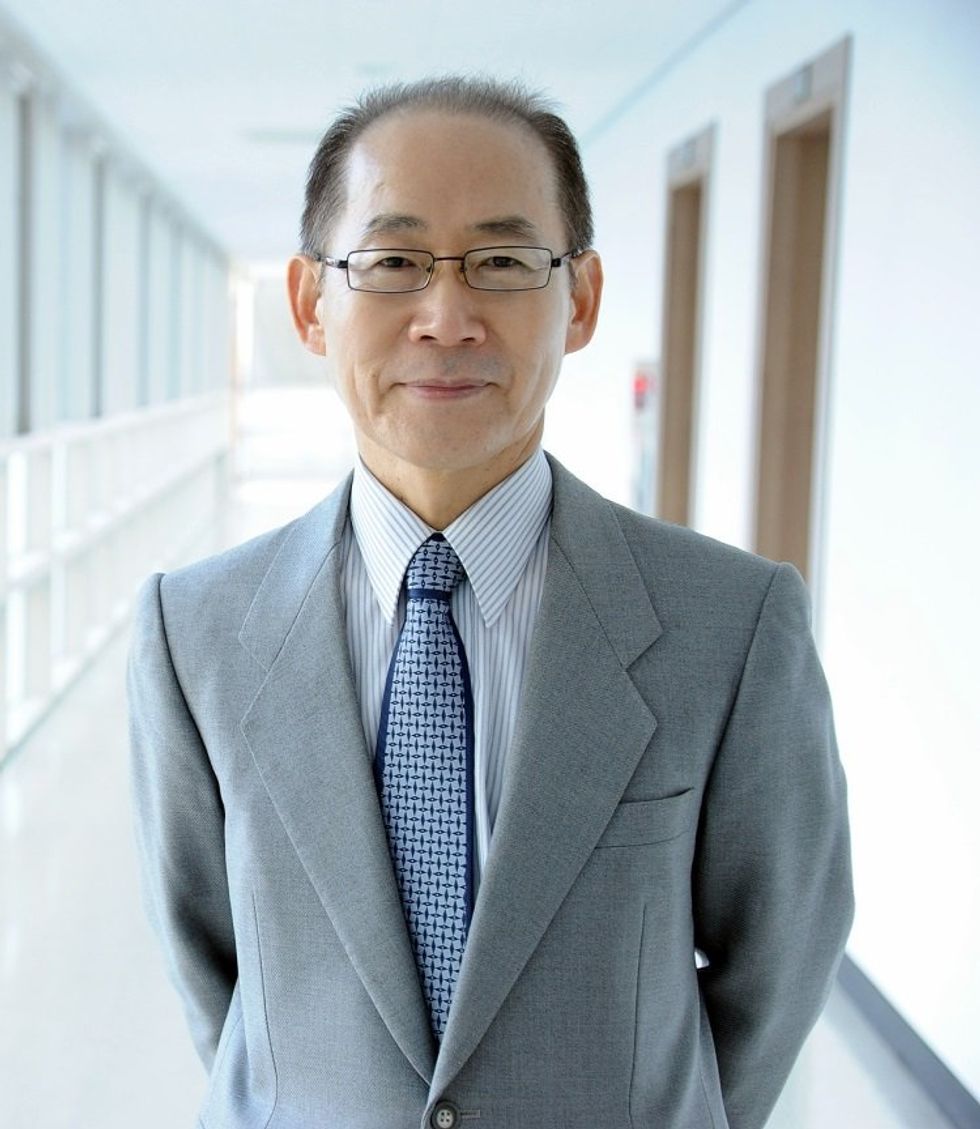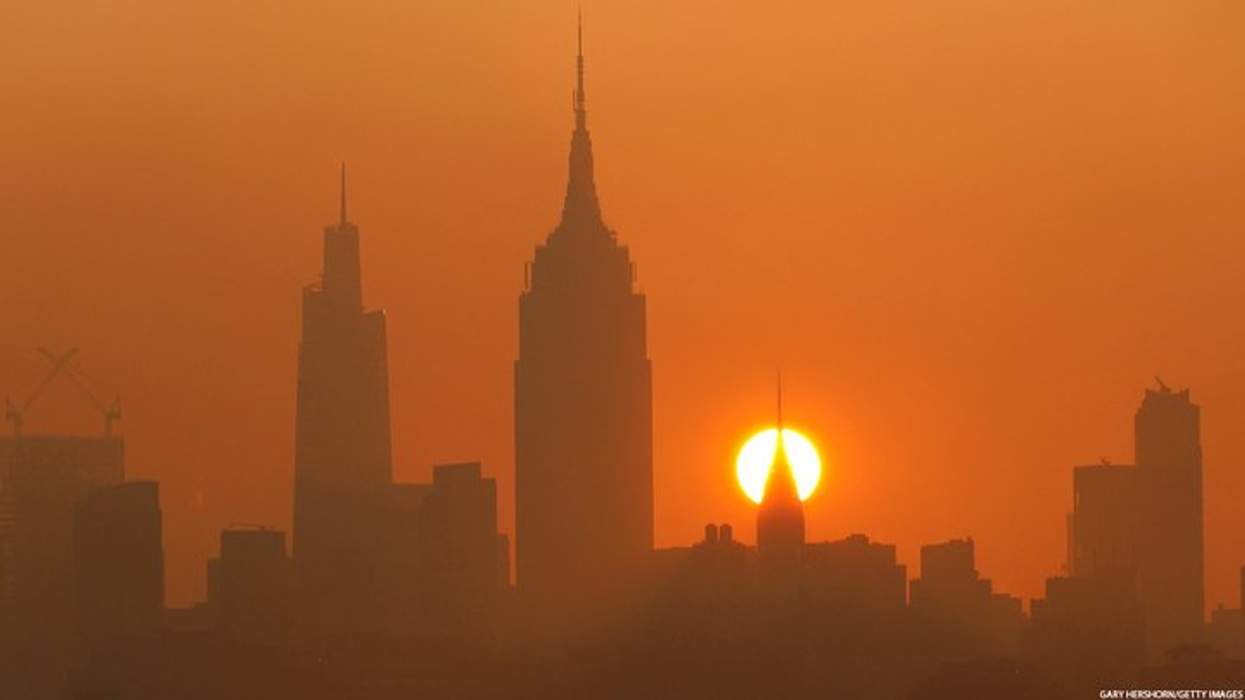Because of my past experience working on climate change, I'm getting hit with questions about why it's so hot — everywhere — and why the Earth is setting record global temperatures at record pace. The New York Times ran a story with a frightening and worrisome headline, "Climate Disasters Daily? Welcome to the 'New Normal."
Frightening because we better starting figuring out how we're going to adapt to these disasters, and worrisome, as the article points out, "As climate disasters become more commonplace, they may be losing their shock value." We need people to be paying attention — more than ever.
I'm not a scientist, but I once worked with many who told me that the scenarios we are seeing, a.k.a. the "new normal'," i.e. scorching temperatures, roaring wildfires, drifting smoke, and flooding rainfalls, are due in large measure to the increased carbon in our atmosphere. Watching the South here in the United States burn, seeing New York City turn orange last month, and multiple deluges in New England have made me think about those scientists and about how their ominous predictions are coming to fruition, and much sooner than expected.
Previously, I wrote about my past work on behalf of the United Nations Intergovernmental Panel on Climate Change. I had the honor of working with some of the 1,000+ scientists (none of whom are paid) from around the world who compose the UN IPCC in the run-up to the 2015 Paris treaty accords. My role was to help the scientists better communicate their research that comprises the body’s massive Assessment Reports.
Those reports, released in cycles, provide an evaluation of the state of scientific, technical and socio-economic knowledge on climate change, its impacts and future risks, and options for reducing the rate at which climate change is taking place.
Since the UN IPCC was established in 1988, it has released six Assessment Reports (AR1-AR6), usually in four parts over the span of one year. I worked on the Fifth Assessment Report (AR5) in 2013-2014, before the Paris accords. Its most recent, Sixth Assessment Report (AR6), was released in four parts from August 2021 to March of this year.
Nearly 8,000 pages long, AR6 details the destructive consequences of rising greenhouse gas (GHG) emissions around the world that includes the demolition of homes, the loss of livelihoods and the fragmentation of communities, as well as the increasing dangerous and irreversible risks we face if we do not course correct.
As the world’s most authoritative climate organization, the UN IPCC shared the Nobel Peace Prize with Vice President Al Gore in 2007. Both were awarded for their “efforts to build up and disseminate greater knowledge about man-made climate change, and to lay the foundations for the measures that are needed to counteract such change."
Dr. Hoesung Lee is chair of the Intergovernmental Panel on Climate Change, elected in October 2015, and endowed chair professor at Korea University Graduate School of Energy and Environment in Seoul. He served as vice-chair of IPCC from 2008 to 2015, and has been lead author and review editor for the various IPCC assessments. He has served on many national and international committees addressing climate change and energy.
I was honored that Dr. Lee agreed to answer some questions from The Advocate about the importance of the UN IPCC, its role, its findings, and his outlook for our future.

Can you shed some light on why it's vital that scientists from all over the world, and all walks of life, participate in the UN IPCC global state of the Earth's climate reports?
The IPCC needs to be as inclusive as possible to ensure a truly global assessment of climate change. Climate change is a global problem that affects all countries and all corners of our globe. To adapt to and mitigate climate change, we need to understand better how it is affecting every single region of the world.
How long does it take to prepare each of these massive Assessment Reports?
It takes about five to seven years to prepare a full assessment report. Because of the COVID-19 pandemic, the current, Sixth Assessment Report, which we are concluding in July this year, has taken just over seven years.
Since the UN IPCC was founded in 1988, do you think that it's raised awareness about what's going on with climate change, the severity of what’s happening, and what we are facing like these record global temperatures?
It has been almost 35 years since the IPCC has been providing governments and policymakers with scientific assessments on the most up-to-date state of scientific knowledge about climate change. Each IPCC assessment report has fed directly into international climate policymaking.
The first assessment report of 1988 played a decisive role in the creation of the United Nations Framework Convention on Climate Change (UNFCCC), the key international treaty to reduce global warming and cope with the consequences of climate change.The Second Assessment Report (1995) provided important material for governments to draw from in the run-up to the adoption of the Kyoto Protocol in 1997. The Third Assessment Report (2001) focused attention on the impacts of climate change and the need for adaptation. The Fourth Assessment Report (2007) laid the groundwork for a post-Kyoto agreement, focusing on limiting warming to 2 degrees Celcius. The Fifth Assessment Report, the one you referenced and worked on, provided scientific input into the Paris Agreement. The Sixth Assessment Report will feed into the first Global Stocktake taking place during the COP28 in December in Dubai where countries will be assessing their progress towards achieving the long-term goals of the Paris Agreement.
Why is it important for countries to pay attention to the science behind climate change?
It is important that governments and policymakers have a full understanding of what the most up-to-date science says about climate change and the options available today in all sectors to make informed decisions. The IPCC was set up by the World Meteorological Organization and the United Nations Environment Programme to assess the science related to climate change and provide governments and decision-makers at all levels with scientific information that they can use to develop their climate policies and shape their actions.
Why should world leaders rely on the UN IPCC for guidance on addressing climate change?
The IPCC is an important and unique interface between scientists and policymakers. IPCC is a panel of 195 member governments. It brings together the world’s top climate scientists to assess what is known and not known about climate change, its implications and risks, as well as to assess pathways for adaptation and mitigation strategies.
Thousands of top climate scientists from around the world volunteer their time as authors to write IPCC reports. Governments take part in the various stages of the report preparation process, i.e scoping, review, approval of the summary for policymakers, and acceptance and/or adoption of the report. Through this process, governments also take ownership of the report and its findings.
What are two or three of the most important recent scientific facts that global citizens should be aware of?
First, that climate change is widespread, rapid, and intensifying. It is a threat to human well-being and the health of the planet. We are not on track to limit the warming at 1.5 degrees Celsius. The time for action is now, and if we change course, we can halve greenhouse gas emissions by 2030.
The current pace and scale of climate action are not enough to tackle climate change and reduce these emissions; however, there are options available now in every sector. Any further delay in concerted global climate action is missing a brief but rapidly closing window when we can secure a livable future.
Do you think that the world is doing enough to at least mitigate the implications of climate change?
One of the key findings of the recently released Sixth Assessment Report is that the current pace and scale of climate action is not enough to tackle the challenge before us. The good news is that we can do it. There are multiple feasible and effective options available to reduce emissions and adapt to human-caused climate change. Also, there are policies, regulations, and market instruments that are proving effective. If these are scaled up and applied more widely and equitably, they can support deep emissions reductions and stimulate innovation.
Do you think that we should be hopeful for the future, and how can all of us best support science, as well as the scientists of the UN IPCC who are really working around the clock on our behalf?
The science could not have been clearer. Climate change is happening and is a huge challenge, having an adverse impact on our well-being as well as the health of the planet. Our reports are also a message of hope. They warn that we have a fast-closing window to act to keep global warming under 1.5 degree Celsius and that we have pathways to solutions and options, available now, in every sector. Science has shown that every fraction of warming matters. Taking more comprehensive and determined climate action now could result in the transformational change essential for a sustainable, equitable world.
John Casey is senior editor of The Advocate.
















Charlie Kirk DID say stoning gay people was the 'perfect law' — and these other heinous quotes
These are some of his worst comments about LGBTQ+ people made by Charlie Kirk.